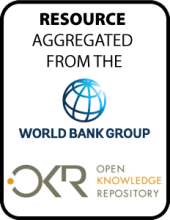Land Library
Welcome to the Land Portal Library. Explore our vast collection of open-access resources (over 74,000) including reports, journal articles, research papers, peer-reviewed publications, legal documents, videos and much more.
/ library resources
Showing items 145 through 153 of 5331.Weather risk and incomplete insurance
markets are significant contributors to poverty for rural
households in developing countries. Weather index insurance
has emerged as a possible tool for overcoming these
Policy makers and regulators have
devoted much effort to reforms aimed at improving financial
stability in response to lessons from the 2007-09 crisis. At
the same time, much effort has also been directed to
Rwanda's completion, in 2012/13, of
a land tenure regularization program covering the entire
country allows the use of administrative data to describe
initial performance and combine the data with household
This paper estimates farmers’ investment response to food price spikes using household panel data collected before and after the 2007/08 food price crisis in Indonesia.
Almost a decade after a spike in land demand following the 2007–08 commodity boom, evidence on impacts of this phenomenon remains limited and mostly case study based.
To meet carbon emissions targets, more than 30 countries have committed to boosting production of renewable resources from biological materials andconvert them into products such as food, animal feedand bioenergy.
The MEM is the World Bank's biannual flagship publication on Malaysia. It provides analysis of recent economic developments and the near-term outlook for Malaysia. Each publication also focuses on a special topic related to Malaysia's transformation into a high-income economy.
This Systematic Country Diagnostic (SCD) is designed to assess the key constraints and opportunities facing Mozambique as it strives to sustain robust growth and macroeconomic stability while accelerating poverty reduction and promoting greater economic inclusiveness.
Use of conditional cash transfers has become widespread in development policy given their success in boosting health and education outcomes. Recently, conditional cash transfers are being used to promote pro-environmental behavior.






